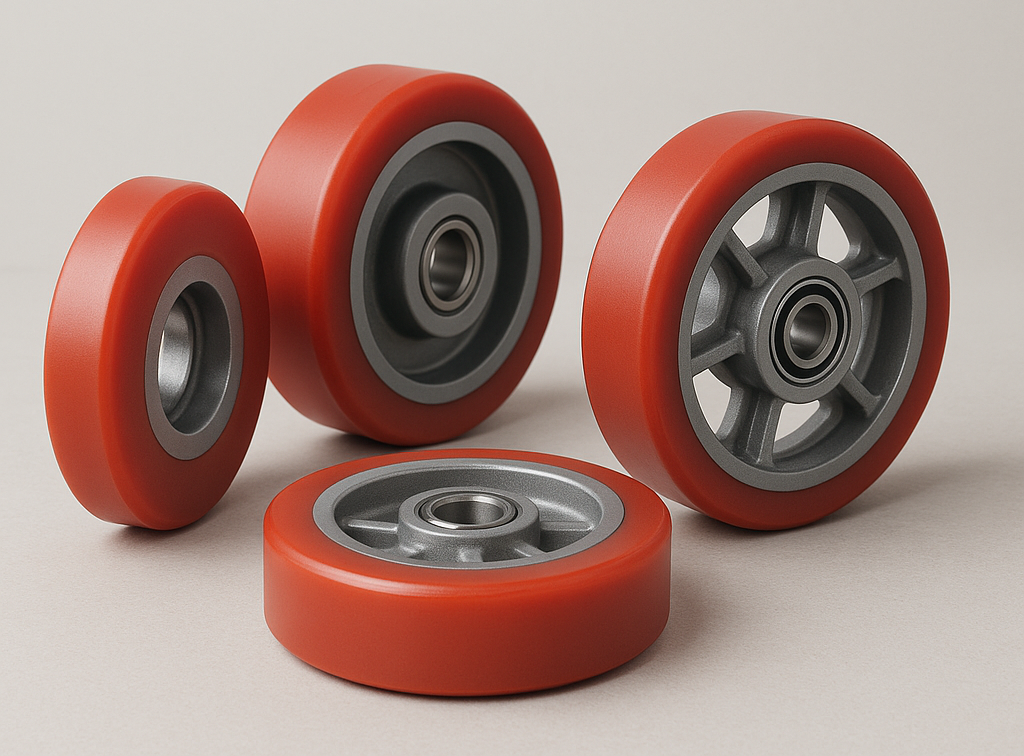When it comes to industrial equipment, performance and reliability are non negotiable. That’s why many industries rely on custom polyurethane wheels for handling heavy duty operations. Whether it’s manufacturing, warehousing, or logistics, the right wheels can make a significant difference in equipment lifespan, floor protection, and operational efficiency.
In this article, we’ll explore the top benefits of using custom polyurethane wheels, especially in demanding environments. You’ll learn how they outperform traditional wheel materials, why customization matters, and what features to look for when selecting wheels for your specific needs.
Why Custom Polyurethane Wheels Are a Smart Investment
What Are Custom Polyurethane Wheels?
Custom polyurethane wheels are specialized caster or drive wheels made from polyurethane a high performance elastomer that combines the flexibility of rubber with the durability of plastic. These wheels can be engineered for specific load capacities, surface types, environmental conditions, and operational needs.
Key Benefits at a Glance:
- Excellent load-bearing capacity
- Resistance to wear, chemicals, and abrasion
- Floor protection and noise reduction
- Custom hardness (durometer) for tailored performance
- Longer service life than rubber or plastic alternatives
1. Superior Load Capacity and Durability
One of the primary reasons industries choose urethane wheels is their ability to carry heavy loads without deformation. Polyurethane has a high load-bearing capacity, making it ideal for heavy duty polyurethane wheels used in material handling and industrial transport.
Compared to rubber wheels, polyurethane can:
- Handle up to two to four times more weight
- Maintain structural integrity over long use cycles
- Reduce the need for frequent replacements
2. Customization Enhances Performance
The ability to customize polyurethane wheels adds significant value. By adjusting the wheel’s size, tread pattern, durometer (hardness), and core material, manufacturers can design a polyurethane wheel optimized for a specific application.
Common customization features include:
- High-rebound formulas for energy efficiency
- Anti-static compounds for electronic environments
- Low-compression materials for high-load shelving or carts
Custom options ensure that each wheel meets the demands of your specific use case, whether in industrial polyurethane wheels or specialty polyurethane castors.
3. Chemical and Abrasion Resistance
Polyurethane wheels are highly resistant to many industrial hazards, including:
- Oils and greases
- Cleaning chemicals
- Abrasive floor debris
- Extreme temperatures (in specialized formulas)
This makes them ideal for harsh environments such as manufacturing plants, automotive facilities, and chemical processing units. Even urethane caster wheels used outdoors show excellent performance under fluctuating temperatures and wet surfaces.
4. Floor Protection and Reduced Noise
Unlike harder materials such as steel or cast iron, poly wheels provide a quieter, floor-safe solution.
Their shock-absorbing capabilities help reduce vibration, noise, and impact damage, which can:
- Improve workplace safety
- Decrease noise pollution
- Extend flooring life in high traffic areas
This is especially important in facilities where smooth operation and cleanliness are essential, such as food processing or hospitals.
5. Longer Service Life = Lower Operational Costs
Although the initial investment in custom polyurethane wheels may be higher than standard rubber wheels, their long-term value is undeniable. Their exceptional resistance to wear and tear means fewer replacements, less downtime, and reduced labor costs over time.
Additionally, many manufacturers offer wheel polyurethane options with built-in maintenance indicators or self lubricating components adding even more ROI to your investment.
Common Use Cases for Custom Polyurethane Wheels
Here are examples of how businesses benefit from these wheels in various industries:
- Warehousing: Used on pallet jacks, dollies, and conveyors for smooth transport of heavy loads.
- Automotive Manufacturing: Integrated into assembly line carts and robotic transport systems.
- Medical Facilities: Non-marking polyurethane wheels used in mobile diagnostic equipment and carts.
- Food Processing: Cleanroom-compatible poly wheels with hygienic properties.
- Aerospace: Deployed in ground support equipment that requires high strength and resilience.
Frequently Asked Questions
What are the advantages of polyurethane wheels over rubber?
Polyurethane wheels offer higher load capacity, greater wear resistance, better floor protection, and chemical resilience compared to rubber.
Are shock-absorbing polyurethane castors available?
Yes, many urethane caster wheels are designed with shock absorbing properties, making them suitable for transporting sensitive or heavy equipment over uneven surfaces.
Can I get low-profile custom polyurethane wheels?
Absolutely. Low profile polyurethane castors can be custom-built for applications requiring a compact wheel without sacrificing strength or durability.
Conclusion
Whether you’re managing a warehouse, operating a medical facility, or handling industrial equipment, custom polyurethane wheels deliver the durability, performance, and customization needed to handle the job efficiently. They not only improve operational flow but also lower long-term maintenance costs making them a wise investment for any heavy duty application.









